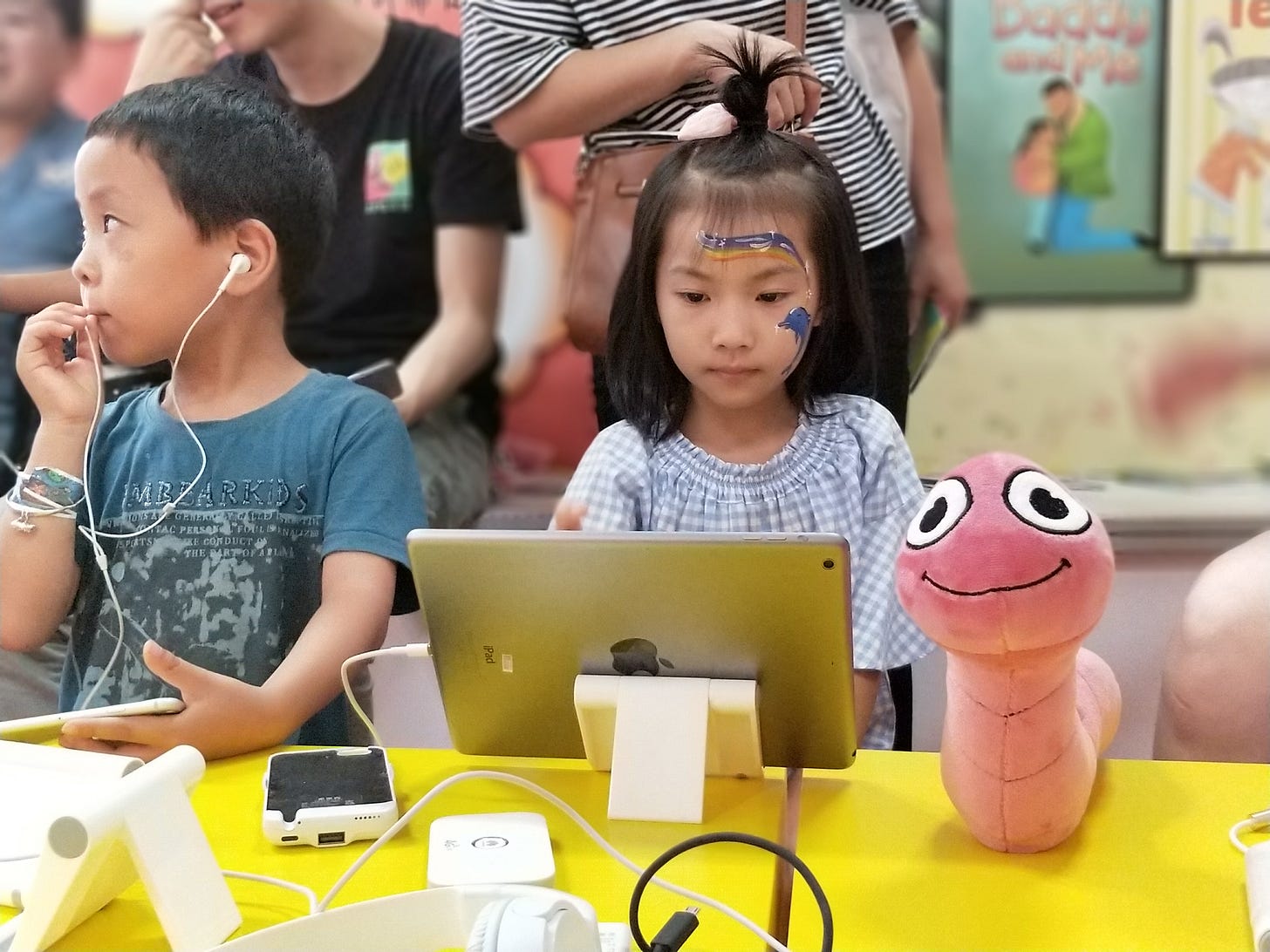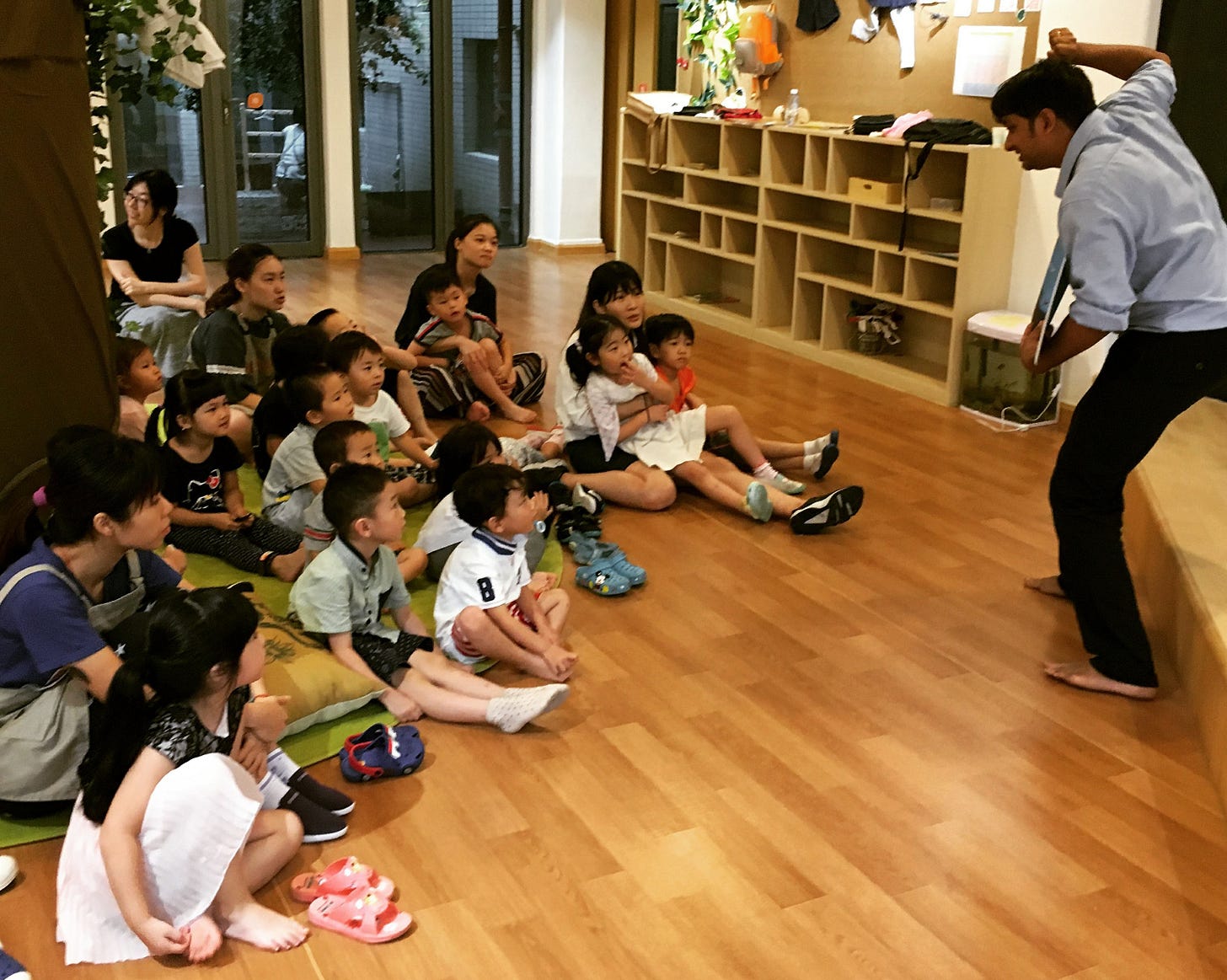The Anticipation Plot - Chapter 3: The Person I am Not
I started up in 2009, and I exited my company in 2020. In a 6 part series I recollect stories and reflect upon my journey. This is the third chapter - The Person I am Not.
Risk-taker
Most startups fail - 90% fail within the first five years1. Among the rest, a significant number don’t make it big - they just survive. A tiny sliver of startups actually succeed. Yet people are foolish enough to start up. They are risk-takers, they thrive on risk.
______
By 2015, I’d realised that my company - Multistory Learning (MSL) - was operating in a small category. We were selling Indian kid-lit and reading programmes. Our competitors were Karadi Path, Wings of Words, and a few mompreneurs. Globally, the largest company in our category was Scholastic - but their India business was small. Our own projection showed that we would hit a plateau at an annual sales of $1m with a margin of 25%.
Should we pivot to something bigger? But what? Our experiments were failing. Plus, making the company bigger would require us to raise VC capital - which would come with the expectation of fast growth. We were a nerdy creative company - would my team be able to handle growth pressure?
Additionally, the idea of owning a small, profitable, dividend paying, boutique, creative company sounded … nice.
Yet, there was no denying that I had personally outgrown MSL. Naresh and I deliberated. I told him that I wanted to do more. It was decided that I would leave the company and he would take over.
We called for a meeting. And delivered the news to the team. We passed around a bottle of whiskey to soften the “jhatka.2”
_____
In April 2017, I joined Invention Labs, which had recently raised money from K-start for a game based English teaching app. Invention Labs was run by my friend Ajit “Q” Narayanan. He was a hard core technologist who believed that “good products sell themselves.” I joined him as head of markets - to sell his products, and to balance his world view.
Ajit was called Q after the Quartermaster in the James Bond franchise. True to his name, he was a mad-scientist-genius who had come back to India in 2007 to “invent things.” He had developed “FreeSpeech,” on which he had given a TED talk3. He told me that he went up on stage after Bono.
Ajit’s company was getting into English teaching apps, for which he had proposed that we pick China as our market. The Chinese app ecosystem was highly evolved - our technology would have to be outstanding to be differentiated. Plus, there were significant cultural barriers - especially language and food.
Yet, Ajit picked China. He reasoned that Chinese schools start teaching English only by grade 3 even though Chinese parents want their children to learn English earlier. There are very few English teachers (unlike in India). Smartphones and online payments (WeChat) are ubiquitous.
We set to work, making multiple product changes in quick succession. By June, we had started selling a speech based product for K-3. By October, we had 150K downloads with $5K MRR revenue. Then, we ran out of money.

_____
Working with Q, I realised that I wasn’t a risk-taker. I loved an adventure - and we did some pretty crazy things in China, but I wasn’t carrying any risk - Ajit was.
And even for MSL, one could argue that we’d remained small because our strategy was inherently risk-averse. We always grew only from our retained earnings, or via bank debt. We didn’t take any risk capital.
_____
I wonder how true the narrative of the risk-taking entrepreneur is. Most of the entrepreneurs I’ve met and worked with take carefully calculated risks, including Ajit. The narrative of entrepreneurs as adventurers gambling their lives away like Christopher Columbus going into the open sea to discover the new world, holding their nerve through a trial-by-fire, makes for fabulous storytelling. But is it true? I don’t know.
All I can say for sure is that I’m generally risk-averse.
Personal Sacrifice
More than risk, entrepreneurship involves sacrifice.
There is a story in the media about Zomato co-founder Deepinder Goyal working from the hospital ward where his wife was giving birth to their first child4. He was on the phone, signing papers, giving orders.
I can’t imagine myself doing that. In complete contrast, I was there with my wife throughout her labour - in the delivery room - and after - for the first few weeks. The theatre of birth was incredibly exciting. Plus babies benefit immensely from skin-skin contact with their parents. Parental bonds start there. For me, that was more important.
It’s not that I’ve not sacrificed at all. I’ve put in thousands of 65+ hour weeks, including in 2021. Missed family engagements. Worked through birthdays and festivals. All of that. Startup life is a hustle5.
But, after a point, it's a Faustian bargain - trading well-being and time for startup growth. Not my cup of tea.
Specialist
After my China adventure ended prematurely, I was at a crossroads. I could mould myself in any which way - product guy, business leader, marketing, strategy, coder? With my experience, I would be of value to so many companies. I met senior folks at Ather, Mad Street Den, Freshworks, and Chargebee. Chargebee had a position open for “design director.”
I have always loved design. I was decent at art in school, and I applied to NID in college. At IIT, I had a perfect score in all three courses of engineering design. I applied to Chargebee, and I got the job. For a bit, I did well. I worked hard. I ran a few interesting projects, including rebuilding Chargebee’s talent brand. One of the most interesting projects I worked on was a campaign to nudge out-of-Chennai folks to consider Chennai - "#ChennaiBeyondStereotypes.
Eventually I ran out of depth - I didn’t have enough domain expertise. And I wasn’t making any friends. So I left, and moved to Bangalore.
_____
One afternoon, in 2018, I found myself with a friend from college, Sahil Kini. He is tall, physically and metaphorically - an ex-entrepreneur, an ex-VC, and currently leading the breakthrough fintech startup Setu6. He towered over me, “But WHAT do you do? Design? Marketing? Product? Strategy? Code? What?” I was a jack-of-all-trades, a generalist. His contention was that “startups need specialists.” And I was not. “Why will anyone hire you?”
_____
Earlier this year, I read David Epstein’s Range: Why Generalists Triumph in a Specialized World. Range claims that superspecialists do well in “kind domains” where there are fewer random acts. He offers firefighting as an example. On the other hand “wicked domains” require generalists to build bridges, see connections, and join the dots.
"Facing uncertain environments and wicked problems, breadth of experience is invaluable. Facing kind problems, narrow specialization can be remarkably efficient. The problem is that we often expect the hyper specialist, because of their expertise in a narrow area, to magically be able to extend their skill to wicked problems. The results can be disastrous."
And that’s really when it hit me: I’m not a specialist. Except for storytelling, where I can claim some mastery.
“Ceil, have you heard of the hook-hold-payoff structure of a story?” I asked the ceiling.
“Nope.”
“It’s just as the name suggests - you hook the reader, hold her, and give her something useful as a payoff,” I explained.
“Ok. That makes sense,” Ceil said. “Why do you mention it now?” Seems abrupt.”
“Because we’re in the hold of this story. The great middle. The storyteller wants the audience to take a deep breath7, reflect on what’s transpired so far. The teller lets the story sag a little bit. But the audience gets distracted. They want to check their phones.”
“I’m not checking my phone,” interrupted Ceil.
“I appreciate it, Ceil. But do you even have a phone?”
You’ve just finished the third chapter. Missed an earlier chapter? Click here: 1. The First Big Why and 2. Timing is Everything.
The Next Chapter:
Jhatka and halal are the two ways to kill an animal. Jhatka is a single death blow to the neck. And in halal, the executioner lets the animal bleed first. I’d learnt (in HUL) that “jhatka is better than halal” for bad news. Jhatka allows for healing to start right away.
Over time, I’ve started recognising the benefits of the other approach - offering bad news in small increments over a time period - it allows for the human mind to adjust. Now, when I choose between halal and jhatka, I always consider the time it takes for the other side to process and react/re-adjust to bad news. If they can’t handle jhatka, then best to go slow.
That startup life requires sacrifice is partly why the ecosystem is inherently discriminatory. What kind of people can offer 65+ hours a week for months at a stretch? Mostly men. Or those who have a stay-at-home parent/spouse. Or those who can afford household help. What about risk-taking ability? It’s the folk from well-off families and colleges who can afford to take greater risks. It’s sad, but true. As a community, we should solve for this.
Sahil Kini writes very well and has been a columnist for The Mint. He also wrote an evocative piece about the death of his earlier startup - link. I wish he’d write more often.
Roger Ebert’s on Studio Ghibli’s Hayao Miyazaki (link) -
I told Miyazaki I love the "gratuitous motion" in his films; instead of every movement being dictated by the story, sometimes people will just sit for a moment, or they will sigh, or look in a running stream, or do something extra, not to advance the story but only to give the sense of time and place and who they are.
"We have a word for that in Japanese," he said. "It's called ma. Emptiness. It's there intentionally."




